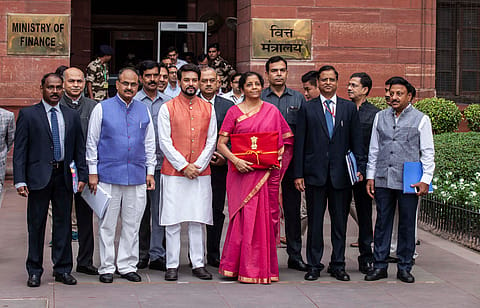Eco Survey: Empower the invisible hand of the market
India, which aspires to be a $5-trillion economy, needs to strengthen “the invisible hand of the market supporting it with the hand of trust”, argues the Survey, which pegs FY21 GDP growth at 6-6.5%.

The Economy Survey 2019-20 seems to agree with the fundamental theory laid down centuries ago by Adam Smith, the father of economics, by acknowledging the importance of the invisible hand of the market in achieving the target of a $5-trillion economy set by Modi 2.0. The Survey, which was unveiled by finance minister Nirmala Sitharaman in Parliament today, categorically argued that it will require the invisible hand to work with “the hand of the trust’’ to create the necessary magic.
But as the Survey points out that it will also require pro-business policies in order to ensure equal opportunities for new entrants, enable fair competition among players and greater ease of doing business. It also calls for doing away with all policies that prevent the invisible hand of the market from functioning effectively through government intervention even if it is not required. To reduce unemployment and create more jobs, it calls for greater trade and efficiently scaling up the banking sector to be proportional to the size of the Indian economy.
Introducing the idea of “trust as a public good that gets enhanced with greater use’’, the survey suggests that policies must empower transparency and effective enforcement using data and technology. For the financial sector, the survey identifies the need for an efficient public sector banking system to support economic growth in the country. It has proposed the creation of a public sector banking network (PSBN), a fintech hub for such banks, and also providing part-ownership of PSBs through employee stock exchange options. “For India to march in its goal of becoming a $5trillion economy, PSBs—the dominant banks in our banking system—need to become efficient. The economy needs PSBs to perform to their fullest potential and support economic growth rather than pull back lending, which has a detrimental effect on growth and welfare,’’ says the Survey.
The survey further adds that given the size of the Indian economy, India should have at least six banks in the global top 100 rather than have just one—State Bank of India—that too ranked 55th in the list of the largest banks globally. It also observes that over ₹4,30,000 crore of taxpayer money has been invested as government equity in PSBs. In 2019, for every rupee of taxpayer money invested in PSBs, investors lost around 23 paise on an average. “The state of the banking sector in India, therefore, needs urgent attention,’’ adds the Survey.
For a nation aspiring to become a $5 trillion economy, “pro-business” policies are a must. It will unleash the power of competitive markets to generate wealth, and at the same time do away with “pro-crony” policy that may favour specific private interests, especially powerful incumbents. To bolster their argument on cronyism that fosters inefficiencies by inhibiting the process of creative destruction, the Survey points out that an equity index of connected firms significantly outperformed the market by 7% a year from 2007 to 2010, reflecting abnormal profits extracted at common citizens’ expense. In contrast, the index underperforms the market by 7.5% from 2011, reflecting the inefficiency and value destruction inherent in such firms.
For the distressed agricultural sector, the Survey calls for a review of the Essential Commodities Act, 1955, a long-term demand of most experts and also calls for a national market for agricultural commodities and providing incentives to the private sector to create storage infrastructure to limit losses. But the Survey is dead against debt waivers because it disrupts the credit culture and reduces formal credit to poor farmers.
To further ensure ease of doing business there needs to be close coordination between the logistics divisions of the ministry of commerce and industry, the Central Board of Indirect Taxes and Customs, the ministry of shipping, and different port authorities. Moreover, individual sectors such as tourism and manufacturing require a more targeted approach that maps out the regulatory and process bottlenecks for each segment.
Recommended Stories
On the issue of job creation, the Survey believes that India has an unprecedented opportunity to chart a China-like, labour-intensive export trajectory. By integrating “Assemble in India for the World” and “Make in India”, the country can raise its export market share to about 3.5% by 2025 and 6% by 2030 and also create 40 million well-paid jobs by 2025 and 80 million by 2030. Calling for aggressive disinvestment of central public sector enterprises (CPSE), the Survey says it will bring in higher profitability, promote efficiency, increase competitiveness, and promote professionalism. To achieve the $5-trillion economy target by 2025, India needs to spend $1.4 trillion over FY2020-FY2025.
As far as the fragile non-banking financial companies (NBFCs) sector is concerned the Survey suggests that there is a need for a diagnostic health score by qualifying the rollover risk for a sample of housing finance companies and retail NBFCs. Health scores not only provide early warnings of impending liquidity problems for these companies but also find favour with the equity markets.
The prescriptions in the Survey are clear and well-articulated, but it remains to be seen whether Sitharaman will take the necessary steps to put it into practice.